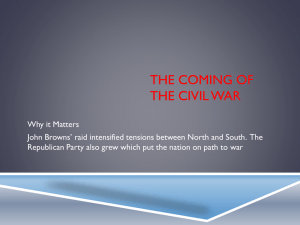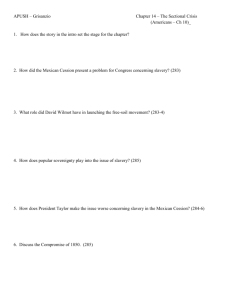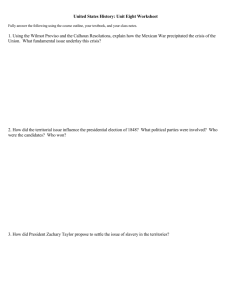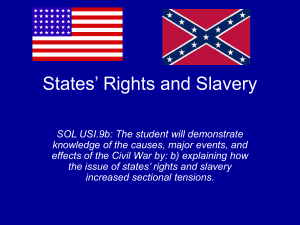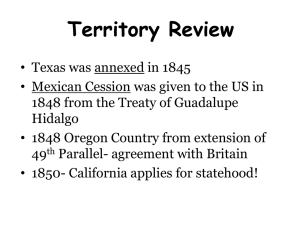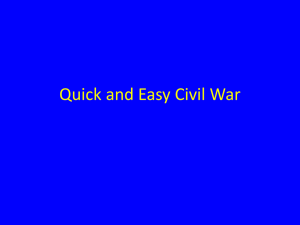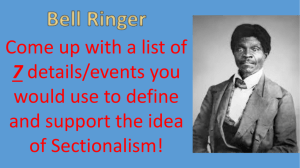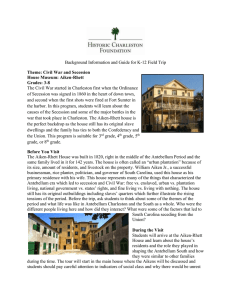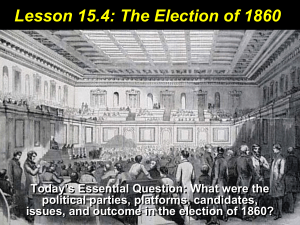File
advertisement
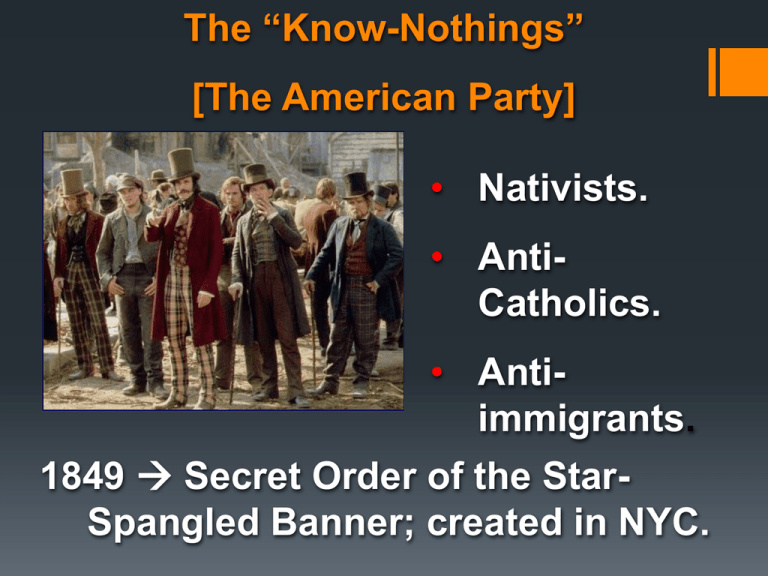
The “Know-Nothings” [The American Party] • Nativists. • AntiCatholics. • Antiimmigrants. 1849 Secret Order of the StarSpangled Banner; created in NYC. Free Labor Ideology Slavery: dangerous to whites North: home of progress, opportunity & freedom Laborers have opportunity to move up to landowning farmer/independent craftsmen Slavery degrades slaves, poor whites & planters West: land of opportunity Protestant ethic Free soil guarantees independence 2 3 "Come on, then, gentlemen of the slave states. Since there is no escaping your challenge, we accept it in the name of freedom. We will engage in competition for the virgin soil of Kansas, and God give the victory to the side which is stronger in numbers, as it is in right.” 4 BLEEDING KANSAS 5 “Bleeding Kansas” Border “Ruffians” (pro-slavery Missourians) “The Crime Against Kansas” Sen. Charles Sumner (R-MA) Congr. Preston Brooks (D-SC) 8 Sharp's Model 1853 “John Brown” slant breech percussion carbine, a “Beecher Bible” John Brown: Madman, Hero or Martyr? Mural in the Kansas Capitol building by John Steuart Curry (20c) 1856 Presidential Election √ James Buchanan John C. Frémont Democrat Republican Millard Fillmore Know-Nothing 1856 Election Results Dred Scott Decision (1857) 12 Does he have legal standing? 13 Kansas in the mid 1850’s Topeka-where the free state government was located Lecompton-where the slave state government was located Lawrence-conflict between pro and anti slavery forces Osawatomie-conflict between pro and anti slavery forces Abraham Lincoln The Lincoln-Douglas (Illinois Senate) Debates, 1858 A House divided against itself, cannot stand. Stephen Douglas & the Freeport Doctrine Popular Sovereignty? John Brown’s Raid on Harper’s Ferry, 1859 18 “I, John Brown, am now quite certain that the crimes of this guilty land will never be purged away, but with blood….” 19 Southerners’ reaction: wrongly believed most Northerners were abolitionists like Brown. Northerners: repudiated his deed, seeing in it an assault on law and order. Southerners who had been undecided on secession were won over to the pro secession side in fear their lives and property were no longer safe from northern intrusion. Southern states reconstituted their militias. 20 The Election of 1860 Four parties ran candidates in the 1860 election 21 Northern Democrats Republicans Abraham Lincoln Southern Democrats John Breckinridge Stephen Douglas Constitutional Union John Bell Republican Party Platform in 1860 • Non-extension of slavery [for the Free-Soilers] • Protective tariff [for the No. Industrialists]. • No abridgment of rights for immigrants [a disappointment for the “Know-Nothings”]. • Government aid to build a Pacific RR [for the Northwest]. • Internal improvements [for the West] at federal expense. • Free homesteads for the public domain [for farmers]. 23 24 25 26 27 28 29 Northern Democrats Southern Democrats 30 32 SECESSION South Carolina was the first state to leave the Union. 33 An ordinance to dissolve the union between the State of South Carolina and other States united with her under the compact entitled "The Constitution of the United States of America." We, the people of the State of South Carolina, in convention assembled, do declare and ordain… that the union now subsisting between South Carolina and other States, under the name of the "United States of America," is hereby dissolved. Done at Charleston the twentieth day of December, in the year of our Lord one thousand eight hundred and sixty. "Our Motto Southern Rights, Equality of the States, Don't Tread on Me" 34 35 Secession!: SC Dec. 20, 1860 Crittenden Compromise: A Last Ditch Appeal to Sanity Senator John J. Crittenden (Know-NothingKY) Southern/Confederate Government started 38 seizing federal forts and installations located in seceding states. President Buchanan refused to give up Fort Sumter located in the harbor of Charleston South Carolina. Fort Sumter before the crisis 39 Lincoln's Inauguration, March 1861 Fort Sumter: April 12, 1861 41 By The President of the United States. 42 A PROCLAMATION. “Whereas the laws of the United States have been for some time past and now are opposed and the execution thereof obstructed in the States of South Carolina, Georgia, Alabama, Florida, Mississippi, Louisiana, and Texas by combinations too powerful to be suppressed by the ordinary course of judicial proceedings or by the powers vested in the marshals by law: Now, therefore, I, Abraham Lincoln, President of the United States, in virtue of the power in me vested by the Constitution and the laws, have thought fit to call forth, and hereby do call forth, the militia of the several States of the Union to the aggregate number of 75,000, in order to suppress said combinations and to cause the laws to be duly executed.” 43 44
